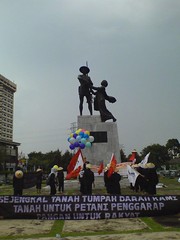Jakarta, Indonesia – In order to commemorate the National Farmers Day on September 24, 2010, Aliansi Petani Indonesia (API) or Indonesian Peasants’ Alliance in cooperation with Front Perjuangan Pemuda Indonesia (FPPI) or the Front of Indonesian Young Struggle, and Solidaritas Anak Jalanan untuk Demokrasi (SALUD) or Street Children Solidarity for Democracy performed a parade at the famous demonstration circle area of Hotel Indonesia (HI), Jakarta. The sympathetic parade was part of a series of actions commenced on September 22, 2010 at the Tugu Tani with theatrical staged, and ended with a join rally with other national people organizations in front of the State Palace in Jakarta on September 24, 2010 (Link: Media Indonesia/Photos of Peasants Action on http://www.mediaindonesia.com/foto/6372/Demo-Petani)
The actions were to demand the government to immediately redistribute 9.6 million hectares of land to peasants, to keep in order and to utilize the land abandoned for the benefit of the peasantry, forming the Adhoc Committee of the Settlement agrarian conflict and to execute the Agrarian Reform, revoked other sectoral Law (e.g. Plantation, Forestry, Water Resources, Food, Mining, Investment, Plant Cultivation System, Plant Variety Protection, and others) for they are in conflict with Pancasila, the Constitution of 1945, and the Agrarian Law 1960, oppose the criminalization of peasants in the agrarian conflict resolution and demanding the government to construct the Farmers Rights Act, raise the price of Government Purchasing Price (HPP) of raw/unhulled grain and rice by 20%, and push Bulog buy the commodity directly to farmers, and the last but not least establish the 24th of September as National Farmers Day.


“We need to take action and demand the government to immediately redistribute 9.6 million hectares of land to the peasants, to put an order and to utilize the land for the benefit of the peasantry. Since fifty years ago, the Law No. 5 year 1960 on basic rules of agrarian (UUPA) has been as an umbrella of agrarian law passed in Indonesia, but it has never been on the run by the government seriously. The Agrarian Law aims to overhaul the agrarian structure inherited injustice of the colonial era. UUPA 1960 is actually the realization of article 33 of the Constitution 1945, which mandates that natural resources and production associated with the lives of many people are managed for the greatest prosperity of the people,” said Ferry Widodo, the coordinator of Action.
“However, 50 years after the promulgation of UUPA, the fate of farmers in Indonesia remains in a state of decline. Ownership of small piece of land (< 0.3 ha) coupled with the fall of price during the harvest time put farmers’ live in a not feasible state. Various efforts of farmers to obtain land rights are often faced by criminalization,” said Muhammad Nur Uddin, the Secretary General of API.
“Based on BPS data, it is showed that rice farming land area in Indonesia up to 2010 remains 12,870.000 hectares, meaning it shrank 0.1% from the previous year of 12,883.000 hectares. The conversion of agricultural land into non agricultural ones, which will be greater if we do not pay serious for attention, it will turn into food scarcity in the future, even starvation would be increases. This is coupled with the policy of the Government Purchase Price (HPP) of the Grain and Rice as a protective mechanism for the fate of rice farmer households is not effective. HPP is still profitable in a handful of traders, while the monitoring mechanism is still very weak,” explain Muhammad Rifa’I, Indonesian Peasant Alliance Program Officer.
“In the 2010 budget, The Government of Indonesia has allocated a subsidy for fertilizer amounting to Rp 14.8 quintillion. The subsidy figures consisted of fertilizer price subsidies amounted to Rp 11.3 quintillion, decreasing from 17.5 trillion expected, and the direct aid of fertilizer (BLP) of Rp 1.6 quintillion and subsidy on organic fertilizer processing unit of Rp 105 billion. The cut of this subsidy will give significant impact on households of farmers, for the highest retail price of fertilizer will certainly hike. From the experience it has shown that the scarcity of fertilizer accompanied by high prices brought a decline in productivity of rice and it will finally lead to the decrease of the welfare of farmers,” said Fadlil Kirom, Advocacy staff of API.
Note:
API is a peasants organization in Indonesia, with total number of member 41 unions in 41 districts across Indonesia. API’s main program are as follows: 1) Empowering members through education and strengthening the economic, political, social and cultural rights, 2) Struggle for Agrarian Reform (a fair system of land ownership to farmers, 3) Struggle for legal protection and farmers rights, especially access to the availability means for production for the peasants, 4) Strengthening solidarity between peasant organizations and build collective power among sectors for the realization of genuine agrarian reform and rural development in justice
For further information:
Muhammad Nur Uddin: Secretary General, Aliansi Petani Indonesia (081 334 344 808)
Muhammad Rifai: Program Officer, Aliansi Petani Indonesia (081 332933581)
Muhammad Fadlil Kirom: Advocacy Division, Aliansi Petani Indonesia (081542287780)
Ferry Widodo: Chief, Front Perjuangan Pemuda Indonesia (085 61865 929)
Secretariat:
Jl. Slamet Riadi IV No 50. Kelurahan Kebun Manggis, Matraman, Jakarta Timur 13150, Indonesia
Tlp/fax: +62 2108564164
Website: www.api.or.id
Mail: api_bumie@yahoo.co.id, seknas@api.or.id




Comments are closed